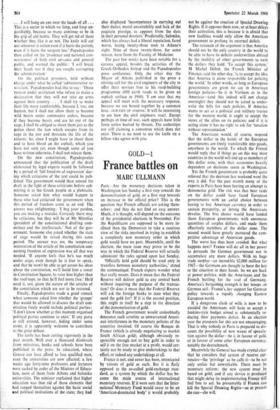France battles on
GOLD-1
MARC ULLMANN
Paris—Are the monetary decisions taken in Washington last Sunday a first step towards the demonetisation of gold, or a first step towards an increase in the official price? This is the question that French officials are asking them- selves: and they do not find an easy answer. Much, it is thought, will depend on the outcome of the presidential elections in November. For the Republicans are supposed to be more in- clined than the Democrats to take a cautious view of the risks involved in trying to establish a completely new monetary order in which gold would have no part. Meanwhile, until the election, the main issue may prove to be the way in which the Federal Reserve Will actually administer the rules agreed upon last Sunday.
'Officially held gold should be used only in transfers between monetary authorities,' stated the communique. French experts wonder what that really means. Does it mean that the Federal Reserve will deliver gold to any central bank without inquiring the purpose of the transac- tion? Or does it mean that the Federal Reserve . will ask the foreign banks to state what they need the gold for? If it is the second position, this might in itself be a step in the direction of the demonetisation of gold.
The French government would undoubtedly denounce such scrutiny as unwarranted Ameri- can interference in the monetary policies of the countries involved. Of course the Banque de France (which is already negotiating to market South African gold), although obviously re- sponsible enough not to buy gold in order to sell it on the free market at a profit, would cer- tainly not be ready to give undertakings to that effect, or indeed any undertakings at all.
France is not, and never has been, intoxicated by visions of gold as such. But it is flatly opposed to the so-called gold-exchange stan- dard, as a system by which the dollar has be- come the main source of international monetary reserves. If it were sure that the Inter- national Monetary Fund would cease to be an 'American-dominated body' it would probably not be against the creation of Special Drawing Rights. If it opposes them now, or at least delays
their activation, this is because it is afraid that new facilities would only allow the American government to prolong its external deficit.
The rationale of the argument is that America should not be the only country in the world to be able to have its deficits underwritten abroad by the inability of other governments to cash the dollars they hold. `To accept this system,' M Michel Debit, the 'French Minister of Finance, said the other day, 'is to accept the idea that America is alone 'responsible for policing the world.' In other words, so long as European governments are given no say in American foreign policies—be it in Vietnam or in the Americas—(and this indeed will not change overnight) they should not be asked to under- write the bills for such policies. If America Wants to act as a political and military trustee for the western world, it ought to accept the views of the allies on its policies; and if it is acting alone it has no right to ask for 'taxation without representation.' s • The Americans would, of course, respond that the dollar in the hands of the European governments are freely transferable into goods, anywhere in the world. To which the French would reply that if things go on this way most countries in the world will end up as members of this dollar zone, with their economies heavily dependent on decisions taken in Washington. Yet the French government is probably quite relieved that the decision last weekend went the way it did. For the past month many of the experts in Paris have been fearing an attempt to demonetise gold. The risk was that bear raids on the dollar could have faced European governments with an awful choice between having to buy American currency in order to sustain prosperity, or letting the Americans devalue. The first choice would have landed those European governments with enormous
quantities of surplus dollars, and made them effectively members of the dollar zone._ The second would have greatly increased the com- petitive advantage of American goods.
The worst has thus been avoided. But what happens next? France will do all in her power
to persuade the German government not to accumulate any more dollars. With its huge trade surplus—an incredible $2,000 million for 1967—the Germans are thoughi to have the key to the situation in their hands. So we are back at power politics, with the Americans and the French battling for the soul of Germany. America's bargaining strength is her troops on German soil: France's, her support for German policy towards a rapidly changing Eastern European world.
If a dangerous clash of wills is now to be avoided the Americans will have to accept a Jenkins-style budget aimed at substantially re- ducing their payments deficit. In an election year the prospects for this are not encouraging. That is why nobody in Paris is prepared to dis- count the possibility of new waves of specula- tion against the dollar—be it in favour of gold, of in favour of some other European currency, notably the deutschmark.
Meanwhile the General has made crystal clear that he considers that system of reserve cur- rencies—the 'privilege' as he calls it—to be not only unfair but unworkable. There must be monetary reform: the new system must be based on gold; and if any device is produced that might delay its implementatiog France Will feel free to act. So presumably if France can kill the Special Drawing Rights—as at present she can—she will.






































 Previous page
Previous page